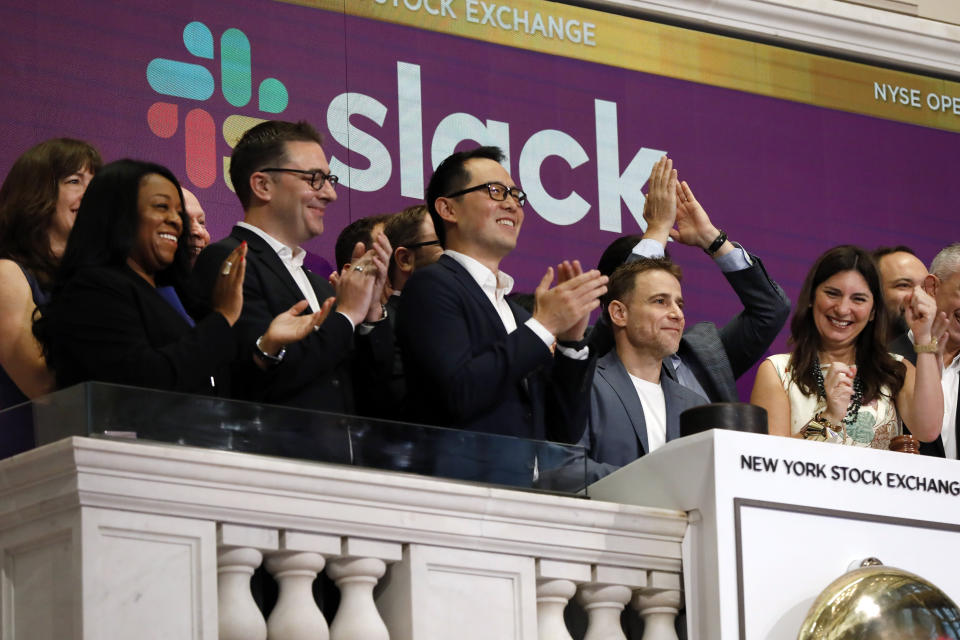'Tariff-proof': One class of recent IPOs is seen as immune to the trade war
Amid the parade of tech IPOs in the first half of 2019, the stocks that have performed the best have not been the consumer-facing household names like Uber (UBER) and Lyft (LYFT). Instead, much of the excitement is around business-to-business SAAS (software as a service) companies like PagerDuty (PD) (debuted on April 11), Zoom (ZM) (April 18), CrowdStrike (CRWD) June 12), and Slack (WORK) (June 20).
The average consumer may not know those names, but investors are showing them the love.
The success these stocks are seeing should send a sign, says DA Davidson analyst Rishi Jaluria, to similar companies mulling an IPO: Now is the time.
“This is kind of the time that a lot of these enterprise software companies should be looking to go public, if they have their financials in order,” Jaluria says. “We talk a lot about this idea of an IPO window, and right now I think the conditions are definitely there: multiples in enterprise software are really rich right now; investor interest is very very high for enterprise software; the fact that all the enterprise software companies this year have done well and continue to do well.”

So, why are enterprise software companies doing so well?
The most obvious characteristic they all share: recurring subscription revenue, which is music to a shareholder’s ears. “You’re not going to have a surprise a year down the line,” Jaluria says, “where suddenly revenue starts to shrink, like you have with some of these high-profile consumer tech IPOs like we saw with GoPro and FitBit.”
Tariff-proof, recession-proof
But Jaluria cites three other key reasons these stocks are soaring.
The first and biggest is about tariffs: “I would argue that most enterprise software companies are tariff-proof,” he says. “They do very little business in China, so any sort of Chinese tariffs won’t impact any of these software companies in a meaningful way, outside of Zoom because they have a decent amount of R&D in China.” Similarly, Jaluria reasons investors see the SAAS stocks as also being recession-proof, if an economic downturn is imminent.
DA Davison ran an analysis of stock performance after the 2008 crisis and determined software companies like Salesforce, NetSuite, and Red Hat all weathered the storm much better than other tech stocks. That’s why Danielle Shay of Simpler Trading calls them “phoenix stocks”—the first to rise after a market pullback.
If investors do indeed see the SAAS companies in that light, it will be a huge boon to their stock performance if the trade war persists. The tariff uncertainty has caused major trouble for big U.S. companies that do a lot of business in China, like Apple, Nike, Starbucks, and InBev-owned Budweiser.

Jaluria’s third reason the SAAS stocks are so hot is a reference to venture capitalist Marc Andreessen’s famous 2011 Wall Street Journal essay: “Software is eating the world.” Eight years later, Jaluria says, the phenomenon is happening again: “Every single company is going through a digital transformation right now, and becoming a software company, and in my mind that backdrop of a really healthy software spending environment helps all these companies grow.”
Bullish on Slack
All of this is why analysts are so bullish on Slack, even though its debut in June via direct listing did not quite have the fanfare of other recent IPOs, and its stock has not popped like the others have.
Baird initiated coverage of Slack last week with an Outperform rating, and raved that Slack’s TAM (total addressable market) can be even bigger than Slack’s own projection of $28 billion. “Anyone who uses email and/or other collaboration tools is a potential customer,” Baird wrote.
DA Davidson is a bit more muted, initiating its coverage with a ‘neutral’ rating, and saying, “Multiple secular tailwinds should benefit Slack, in our view, including the proliferation of best-of-breed SaaS applications and the increasingly collaborative and unstructured nature of work.”
In the second half of 2019, Jaluria expects more IPOs, especially of software names: “I expect the flurry to really start in September.” It’s an easy call to make, when so many have performed so well.
—
Daniel Roberts is a senior writer and show host at Yahoo Finance. Follow him on Twitter at @readDanwrite.
Read more:
SAAS companies like Zoom and PagerDuty are the new ‘phoenix stocks’
Beyond Meat CEO after soaring IPO: 'I'm not going to look every day at the stock price'
The ‘smart athletes’ will go vegan, says NBA champion and Beyond Meat investor John Salley
Uber has lived through a parade of executive exits leading up to its IPO

